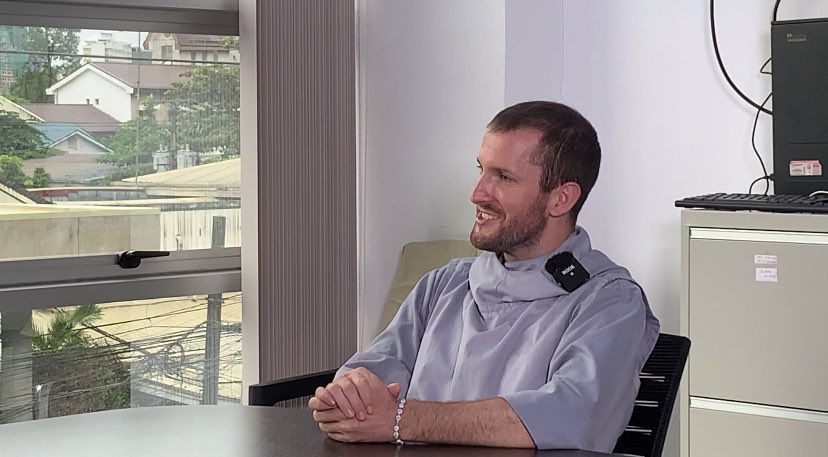CEBU CITY, Philippines—In the bustling city of Cebu, where Cebuano is the language of the streets, learning the local language is an essential part of any foreign visitor in order to navigate, adapt and understand the local culture, traditions, and customs of the area.
Among those who recognize that learning the language is an effective way to bridge the gap and foster stronger ties with the local community is Father Samuel Mary Liedel of the Congregation of St. John, a foreign priest who speaks fluent Cebuano.
Born and raised in Michigan United States, Father Samuel, 29, grew up in a deeply religious household and was the eldest of nine children. For his family, attending mass every Saturday and Sunday was an integral part of their family, nurturing a faith-based foundation throughout his formative years.
READ MORE: FACES OF CEBU: Jessa Ngojo and Gerard Jamora, Mr. and Ms. Press Freedom bets
Before becoming a priest, he had been a musician, playing both the violin and orchestral instruments as a hobby and as a profession.
It wasn’t until he had reached the age of 18 that he began to seriously consider a life devoted to God, believing that the priesthood would be the most suitable way to serve the Church.
“It’s just I pray more often and I think I kinda just discovered something about myself that I didn’t see before, which is I really would have thought to like congregate my life to the Lord and to just serve his church because that is where I was happy was serving church,” Fr. Sam says.
Fr. Sam growing up
He added that growing up in a devout Catholic household provided him with the fertile foundation to be able to make the decision with confidence.
In 2017, Father Samuel was assigned to work in the Philippines, which was no walk in the park due to the significant cultural differences between the two countries, and had to make a lot of changes to get himself use to the new environment.
During an interview with CDN Digital, he shared that while most of the locals speak and understand English, they are more at ease communicating in their native tongue.
“They were very—they are much more comfortable speaking their local language much more comfortable especially the poor people that I was working with. And so I felt very quickly that I wanted to learn the language because it was a way for me to get close to them fast.”
READ MORE: FACES OF CEBU: Jimmy Ricks Grajo, 22, rising musician
He was determined to gain a thorough understanding of the culture, values, and beliefs of the local Cebuanos, so he enrolled in a basic Cebuano course the same year he was assigned to Cebu.
To get a head start with some simple conversational words, he will bring his little notebook and jotted down various unfamiliar phrases. With diligent effort, he was able to become fluent in Cebuano in a short period of time.
“I tried to pick few different things and so I ask questions especially when I started–learned that it is my way to start and make friends.”
In his four years of living in the island, he realized that in a world that all too often plagued by poverty and chaos, lies a strength that cannot be ignored—it is the faith that permeates through the lives of Cebuanos, providing them with hope and courage in challenging times and inspiring resilience and determination in the face of adversity.
“With respect to their faith what impresses me a lot is that I notice that their faith is really a source of strength, which I really didn’t see so much in other cultures I’ve been to.”
He added that for Cebuanos, faith serves as an unwavering pillar, empowering them to persist and believe in life, even amidst the most difficult situations.
“When they say that their faith is what keeps them going it’s not like ‘dili lang Kani siya, Char! [joke] ba… It’s actually giving them strength, for me that’s very encouraging,” he said.
(Their faith isn’t just a jest, an empty sentiment. It genuinely empowers them. For me, that’s beyond encouraging.)
Still adjusting
In comparison to most Westerners, Filipinos do not hesitate to express their faith, which is evident in the way they invoke Jesus in almost every aspect of their life, such as during times of taking an important exam.
“Most of the Filipinos are, most often, they’re not ashamed to show their faith. Something you see less in the US; we are a bit more of the opinion that faith is more of a personal thing.”
He has come a long way, but is still adjusting to life in Cebu. He is not yet accustomed to the long lines, traffic, and the indirect way Filipinos address problems or certain situations.
However, Fr. Sam sees this as way to teach him patience and shaped his personal growth as a priest.
Most importantly, because a priest’s role in society is to become a leader of a special kind; for Father Samuel, the leadership of a priest is one that encourages and enables others to become leaders.
“A priest has a special responsibility; people look up to them… But, like what I personally think, is that we should use this authority to encourage others…That the priest is really a leader, instead of just being, I guess, I could call them a ‘mass machine’, “ he added.
/bmjo



